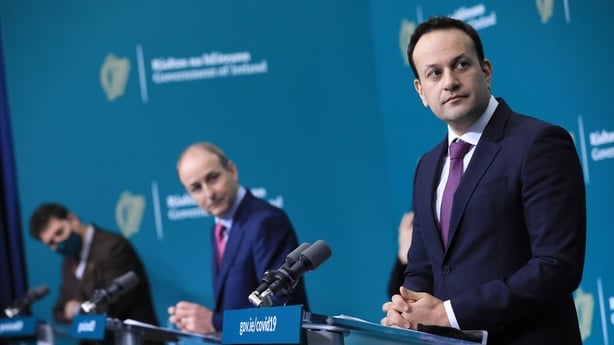Analysis: New research has looked at how effective Government briefings were in convincing citizens to comply with Covid-19 restrictions
By Bernadette Naughton, TUS.; Deirdre O'Shea, UL; Lisa van der Werff and Finian Buckley, DCU
We all have our own stories of 'that moment’ when we realised that the Covid pandemic had hit Irish shores and represented a clear and present danger. In the weeks prior to lockdown in Ireland, many of us have memories of being shocked by news reports showing hospitals overwhelmed by the sick and dying, and disbelief regarding the restrictive curfews that threatened all that we held dear.
We all remember that moment in March 2020 when Taoiseach, Leo Varadkar, walked to a podium in Washington DC and told us that this was a "St Patrick’s Day like no other" and we too, would have to comply with similar prohibitive measures. In the days, weeks and months that followed, national leaders across the world voiced similar appeals to their citizens, gripped by a rollercoaster of emotions each time the restrictions were extended or relaxed. Living under a veil of uncertainty became an all-too-common feature of our existence in the months that followed.
WATCH: Full speech by Taoiseach Leo Varadkar as the country's schools, colleges and childcare facilities are to close in response to the Covid-19 pandemic | Read more: https://t.co/0dZzTUDn4s pic.twitter.com/URGFZUb2jn
— RTÉ News (@rtenews) March 12, 2020
But how effective were those ministerial briefings in convincing us to comply with the pandemic restrictions? In a series of studies, we investigated this very question. In particular, we were interested in the emotional messages that national leaders conveyed in these speeches and whether they had an effect on citizens intentions to comply with the pandemic restrictions.
For example, excerpts from the Taoiseach's St Patrick’s Day speech aptly illustrate the emotional sentiments expressed, e.g., "We will always put your life and your health before all other concerns…all resources we have, both financial and human, are being deployed to serve this great national effort ….I want to send a message around the world-we are in this together -viruses pay no attention to borders, race, nationality, or gender".
These are examples of interpersonal emotion regulation, which refers to deliberate efforts to change or regulate the emotions of another person. In our everyday lives, we do this all the time. For example, we might try to make someone feel better if they don’t do well on an exam, or we might ‘give them a wakeup call’ if we think they are not taking exams seriously enough. In the workplace, research has shown that leaders also engage in attempts to change the emotions of their employees in order to improve relationship quality and team performance.

While there are different strategies that leaders can use to influence or regulate the emotions of others, they broadly fall into two categories: is the motive to improve another’s emotions (i.e., make them feel better) or worsen another’s emotions (i.e., make them feel worse)? The briefings given by national leaders across the world during the pandemic were filled with messages that influenced citizens’ emotions. Accordingly, we examined whether interpersonal emotion regulation that aimed to improve or worsen citizens emotions were more effective in motivating citizen’s compliance with the pandemic restrictions.
One may rightly wonder why a leader might want to make someone feel worse, but negative emotions can be a very effective way of decreasing undesired behaviours from a psychological perspective. Our research showed that the ministerial briefings did increase negative emotions when emotion-worsening strategies were used, but this did not make citizens more likely to comply with pandemic restrictions.
We found that attempts to improve citizens emotions were far more beneficial in terms of citizens' intentions to comply with pandemic restrictions. Emotion-improving strategies worked, not because they decreased negative emotions but rather, because these strategies signalled that the leader could be trusted, and it was because of this trust that citizens were more willing to comply with the pandemic restrictions.
We found that attempts to improve citizens emotions were far more beneficial in terms of citizens' intentions to comply with pandemic restrictions
Our research clearly showed that deliberate attempts to improve emotion can build trust in crisis situations and influence compliance intentions. Trust in the leader was central to compliance and our study provided insight into how leaders can build that trust through the emotional language in ministerial briefings.
Was this a uniquely Irish experience? To examine this, we replicated our study in the UK and found comparable results. Trust in the national leader was associated with higher intentions to comply with the pandemic restrictions. While emotion-improving interpersonal emotion regulation strategies increased trust, emotion-worsening strategies decreased it.
The Covid-19 pandemic was a global crisis unlike anything we have experienced before in our lifetimes. However, global crises are continuing in other forms (climate change, war etc) and our research points to one way in which crisis communication can use interpersonal emotion regulation to influence citizens’ trust in a leader and their behavioural intentions.
Dr Bernadette Naughton is a Lecturer In Psychology at TUS. Dr Deirdre O'Shea is Associate Professor of Work and Organisational Psychology in the Department of Work and Employment Studies at the Kemmy Business School at University of Limerick. She is a former Irish Research Council awardee. Dr Lisa van der Werff is an Associate Professor in Organisational Psychology and programme chair of the MSc in Work and Organisational Psychology/Behaviour at DCU Business School. Prof. Finian Buckley is Professor of Work & Organizational Psychology at DCU Business School.
The views expressed here are those of the author and do not represent or reflect the views of RTÉ

